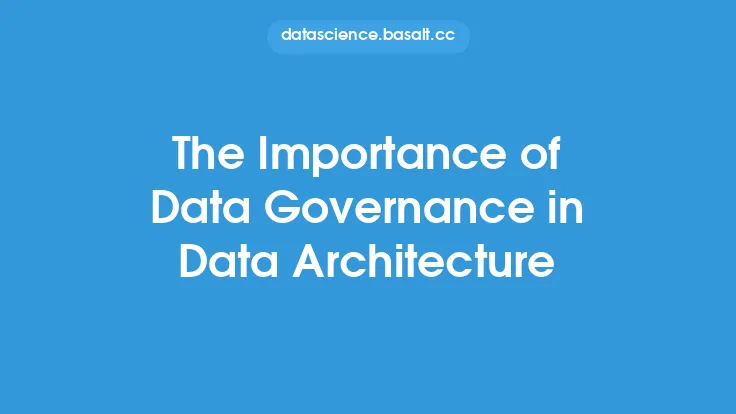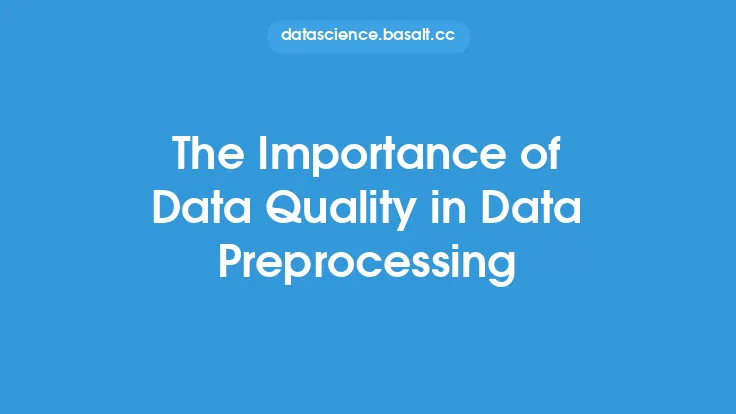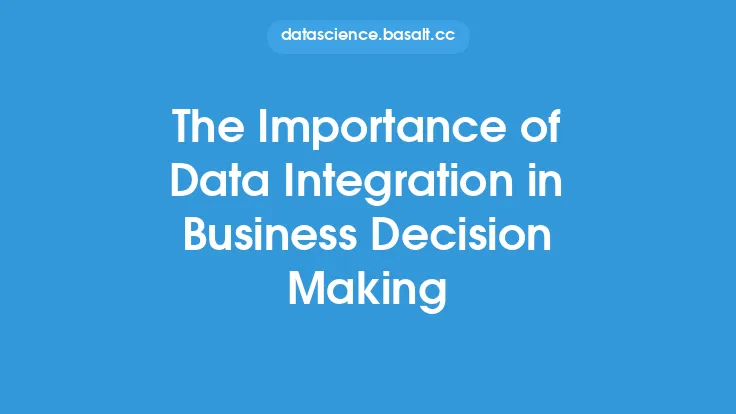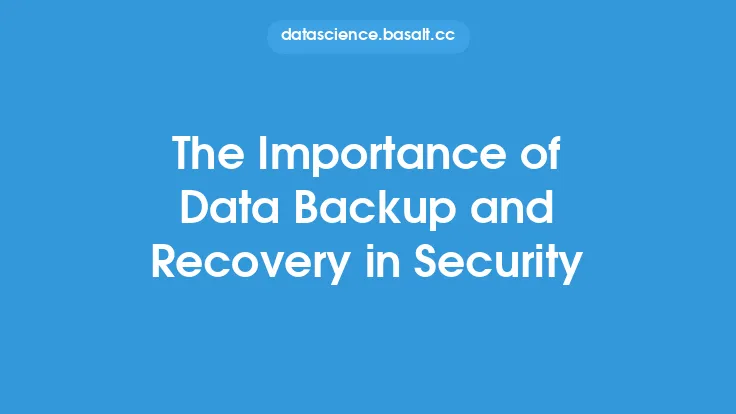Data governance is a critical component of data architecture, as it ensures that an organization's data assets are properly managed, secured, and utilized to achieve business objectives. Effective data governance provides a framework for managing data across the enterprise, enabling organizations to make informed decisions, reduce risks, and improve overall data quality. In this article, we will delve into the importance of data governance in data architecture, its key components, and best practices for implementation.
Introduction to Data Governance
Data governance refers to the set of policies, procedures, and standards that govern the management of an organization's data assets. It encompasses the people, processes, and technology required to ensure that data is accurate, complete, and secure. Data governance is not a one-time task, but rather an ongoing process that requires continuous monitoring and improvement. Its primary goal is to ensure that data is managed in a way that supports business objectives, while also minimizing risks and ensuring compliance with regulatory requirements.
Key Components of Data Governance
Effective data governance consists of several key components, including:
- Data quality: Ensuring that data is accurate, complete, and consistent across the enterprise.
- Data security: Protecting data from unauthorized access, theft, or damage.
- Data compliance: Ensuring that data management practices comply with regulatory requirements and industry standards.
- Data architecture: Designing and implementing a data architecture that supports business objectives and ensures data integrity.
- Data stewardship: Assigning responsibility for data management to specific individuals or teams.
- Data governance policies: Establishing policies and procedures for data management, including data retention, data disposal, and data access.
Benefits of Data Governance
Implementing effective data governance provides numerous benefits, including:
- Improved data quality: Data governance ensures that data is accurate, complete, and consistent, which is essential for making informed business decisions.
- Reduced risks: Data governance minimizes the risk of data breaches, data loss, and non-compliance with regulatory requirements.
- Increased efficiency: Data governance streamlines data management processes, reducing the time and effort required to manage data.
- Better decision-making: Data governance ensures that data is available and accessible to authorized personnel, enabling better decision-making.
- Improved compliance: Data governance ensures that data management practices comply with regulatory requirements and industry standards.
Data Governance Framework
A data governance framework provides a structured approach to implementing data governance. It consists of several components, including:
- Governance structure: Establishing a governance structure that defines roles and responsibilities for data management.
- Policies and procedures: Developing policies and procedures for data management, including data quality, data security, and data compliance.
- Standards and guidelines: Establishing standards and guidelines for data management, including data architecture, data modeling, and data storage.
- Monitoring and reporting: Establishing processes for monitoring and reporting data governance metrics, including data quality, data security, and data compliance.
Data Governance Tools and Technologies
Several tools and technologies are available to support data governance, including:
- Data governance platforms: Providing a centralized platform for managing data governance policies, procedures, and standards.
- Data quality tools: Enabling data quality monitoring and improvement, including data profiling, data validation, and data cleansing.
- Data security tools: Providing data encryption, access control, and authentication to protect data from unauthorized access.
- Data compliance tools: Enabling compliance with regulatory requirements and industry standards, including data retention, data disposal, and data access.
Best Practices for Implementing Data Governance
Implementing effective data governance requires several best practices, including:
- Establishing a clear governance structure: Defining roles and responsibilities for data management.
- Developing policies and procedures: Establishing policies and procedures for data management, including data quality, data security, and data compliance.
- Providing training and awareness: Educating personnel on data governance policies, procedures, and standards.
- Monitoring and reporting: Establishing processes for monitoring and reporting data governance metrics, including data quality, data security, and data compliance.
- Continuously improving: Continuously monitoring and improving data governance practices to ensure they remain effective and relevant.
Challenges and Opportunities
Implementing data governance can be challenging, particularly in large and complex organizations. Common challenges include:
- Lack of resources: Insufficient resources, including personnel, budget, and technology, can hinder data governance implementation.
- Lack of awareness: Limited awareness of data governance policies, procedures, and standards can reduce their effectiveness.
- Resistance to change: Personnel may resist changes to data management practices, particularly if they are accustomed to existing processes.
- Complexity: Data governance can be complex, particularly in large and complex organizations, requiring significant time and effort to implement.
Conclusion
Data governance is a critical component of data architecture, ensuring that an organization's data assets are properly managed, secured, and utilized to achieve business objectives. Effective data governance provides a framework for managing data across the enterprise, enabling organizations to make informed decisions, reduce risks, and improve overall data quality. By understanding the key components of data governance, its benefits, and best practices for implementation, organizations can establish a robust data governance framework that supports their business objectives and ensures long-term success.





